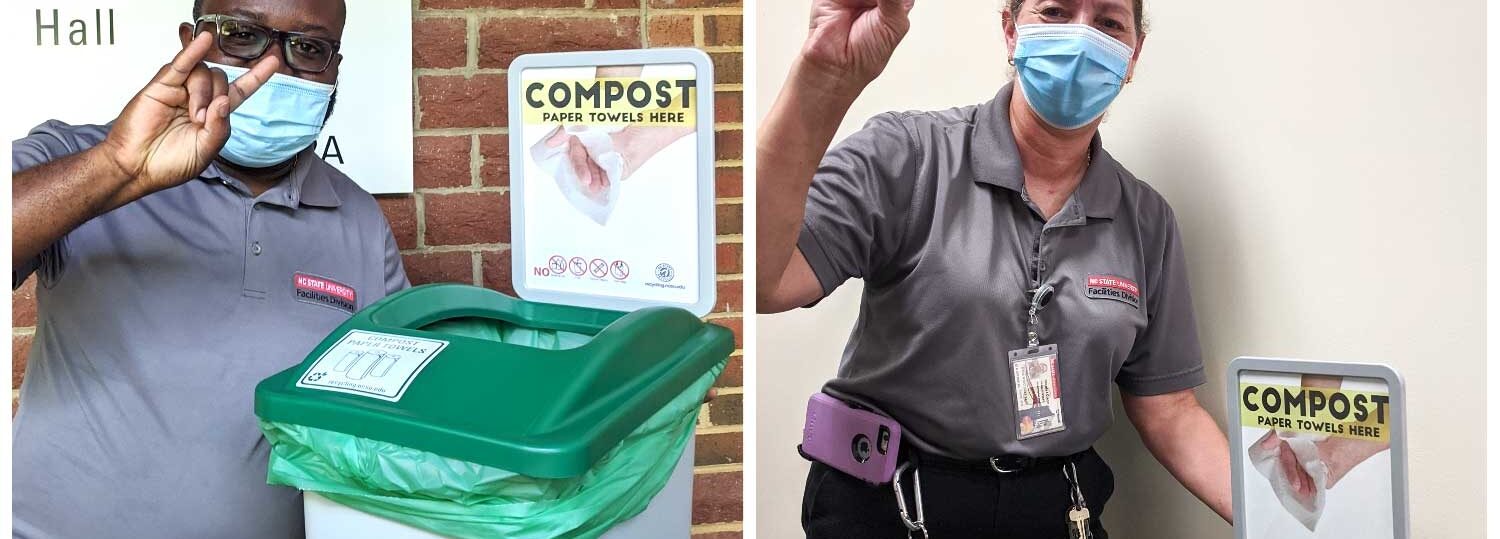The novel coronavirus has not stopped sustainability efforts that would reduce waste on campus. Here’s what is different as the fall semester begins, and how the campus community can help reduce waste on campus.
A Summer Of Progress
- When Fitts-Woolard Hall opens this fall, it will be a complete Zero Waste Workplace. The new engineering building features centralized collection sites and deskside mini bins for composting, landfill and recycling. Also available will be paper towel composting in restrooms and specialized collection bins for plastic film, lab waste and construction or demolition waste.
- Compost collection has also been added at the College of Veterinary Medicine and E.S. King Village, where each apartment receives a composting pail to collect kitchen food waste courtesy of a grant from Wake County.
- With the support of the Sustainability Fund, the Zero Waste Wolves collaborated with University Housing and Housekeeping to install paper-towel composting in the public restrooms of Bragaw, Lee, Sullivan, Wood, Bowen, Carrol, Metcalf, Bagwell, Becton and Berry Residence Halls; Avent Ferry Complex; and Wolf Village and Wolf Ridge Apartments.
- At dining facilities, where indoor seating has been reduced, all students with a meal plan will be given a reusable Pack-N-Go container to help reduce single-use waste. When they are finished with their meal, students can return the container at select dining locations and receive a carabiner, which they can exchange for a new Pack-N-Go container at their next meal. Dining is also introducing strawless sip lids at its retail locations, which include the Oval, Talley Student Union and the Atrium. The new compostable lids, combined with already compostable fountain cups, makes for a completely compostable solution.
How You Can Help
Everyone can contribute to reducing campus waste, particularly during COVID-19:
- Opt for a reusable face covering. It’s an opportunity to express your personal style while also limiting use of disposable face masks. Have several face coverings so that you can wash them regularly. If you prefer disposable face masks, remember that they can be reused if you take good care of them. Set up a rotation system where you have a mask for every day of the week.
- If you use gloves or cleaning wipes, those go in the landfill bins. Any disposable masks that are being discarded should also be placed in landfill bins.
- Choose to use the Pack-N-Go reusable take-out containers from Dining. Use your own reusable utensils instead of disposable to further reduce waste.
- Composting is available at the outdoor tents located near dining halls. Please only place food scraps or paper towels in these bins.
- Wash your hands well and often. You can use bar soap, which is zero waste, or refill soap dispensers. If you are discarding a plastic soap dispenser, recycle the bottle and landfill the pump.
- Use hand sanitizer refill stations, which are located in many campus buildings. These stations have pumps and can refill smaller containers so you always have hand sanitizer with you when you need it.
Stay healthy, and have a great semester.
